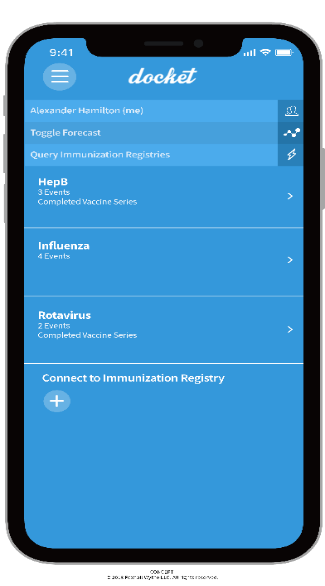The first in an occasional series of “Where are they now?” posts about past ONC Challenge winners
It’s been a little more than a year since the Docket app won the Office of the National Coordinator for Health IT’s (ONC) Move Health Data Forward (MHDF) Challenge, focused on helping consumers consolidate and share their health data. At a recent check in with the Docket team, ONC learned that Docket is continuing to improve patient access by adding new functionality that will allow consumers to access their personal and family immunization records.
During kindergarten registration, back-to-school, or summer camp seasons, when providers receive a high volume of immunization records requests, logjams can occur. To alleviate these slowdowns, HHS and the HHS Office of the CTO supported online access to immunization records (through apps like Docket) by piloting an immunization-specific portal that interoperates with any state immunization information system or systems that complies with standardized bidirectional query-and-response specifications.
Since winning the MHDF Challenge, Docket has built and released an Android version of its app and is working with a number of state health departments to include immunization data in the app. This work is supported by the HHS Office of the Chief Technology Officer (CTO) as part of its Public Health Innovation efforts. In addition, Docket is working with the American Immunization Registry Association and the Centers for Disease Control and Prevention on the recommended core data elements needed for patient matching, as well as following the best practices from both organizations.
Here’s how the Docket app works: individuals download the app, answer ten questions, then use a QR code at their doctor’s office to activate the system and access their health data. Individuals can then securely share the data with that provider or other providers of their choice. (See Docket prototype below).

In the past, individuals were limited to accessing their immunization records by calling or visiting a provider or state’s health department office. This process can be time-consuming and burdensome for providers, patients, and state health departments. By allowing patients access to their immunization records, this process becomes more streamlined. Through Docket app notifications, patients are enabled to better understand immunization requirements and keep an up-to-date immunization status, replacing patients digging into their clinician’s files or going to the health department to see when a vaccine might need to be updated. Since the app has access to the immunization records it can let patients know when it’s time to get an update. They can also print their own immunization certificates, reducing administrative burden on providers and health departments.
Nathan Scott, Docket’s CTO, explained that one of the goals of uploading the immunization data is to improve the health of patients. With all the technology available, he explained, the goal of apps like Docket is to achieve better health outcomes for the patient.
Better outcomes means more people are up-to-date on their shots, helping reduce the potential spread of disease. For example, measles remain a threat to public health. The HHS CTO’s office is currently studying whether there is any correlation between patients having their own immunization data and higher immunization rates for Measles and other infectious diseases.
Docket is a technological answer that helps families get the data they need and helping to reduce burden on physicians and state health departments.
Editor’s Note: Are you an ONC Challenge winner doing interesting things with data or technology? We would like to tell your story!





